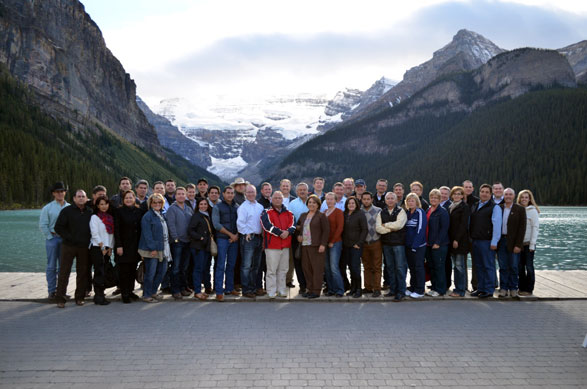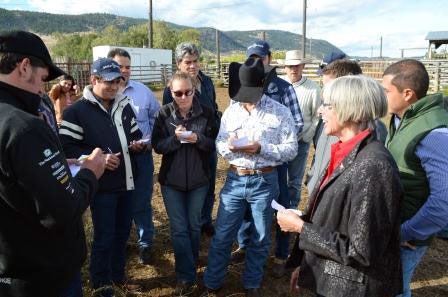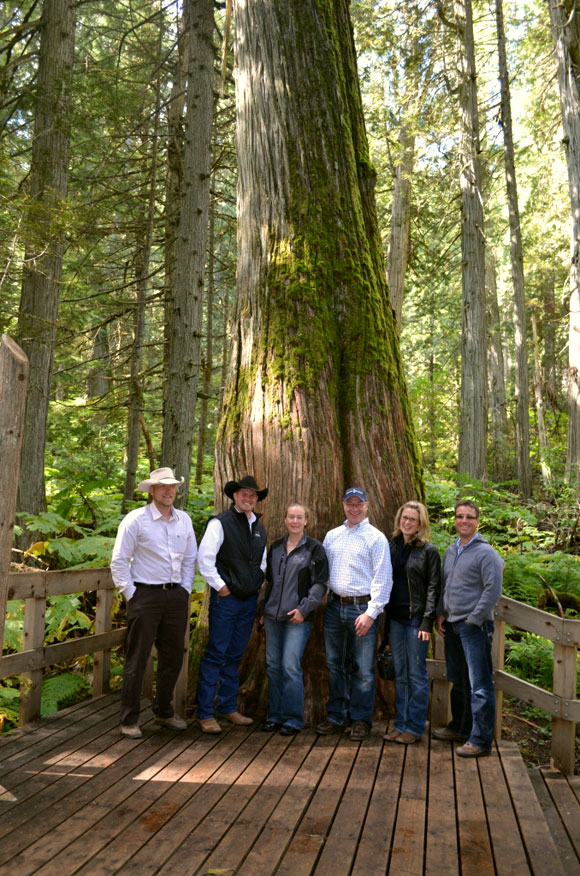This week I’d like to share an article written by Ontario 4-H Council Director, Kim McCaw. Recently, Kim had the opportunity to attend the Five Nations Beef Alliance conference. Kim was one of three ranchers representing Canada at this event. She was selected through the Cattlemen’s Young Leaders (CYL) program which is a mentorship program that provides youth ages 18–35 with industry-specific training through a combination of formal and informal opportunities to learn from existing beef cattle industry leaders. Read on to learn more about the CYL and her experience at the conference. If you’re interested in applying for the CYL more information can be found here > ________________________________________________________________________ Five Nations Beef Alliance Conference By Kim McCaw The Five Nations Beef Alliance (FNBA) conference was hosted by Canada and held in British Columbia in 2012. This conference provides an opportunity to cultivate international relationships between young leaders of the beef industry and build awareness of common goals that adhere to science-based standards. The FNBA is a private entity which includes the national organizations representing beef cattle producers in Australia, Canada, Mexico, New Zealand and the United States. In addition, a group of 15 young ranchers from the five nations were actively participating in the sessions. The three young ranchers representing Canada at this event were Sheldon Kyle, Jake Meyer and myself who were selected through the Cattlemen’s Young Leaders (CYL) program to participate in the Five Nations Beef Alliance Young Ranchers Program. The CYL program is a mentorship program that provides youth ages 18–35 with industry-specific training through a combination of formal and informal opportunities to learn from existing beef cattle industry leaders. The youth accepted into this program participate in provincial, national, and international high level discussions and events that define the direction and future of the Canadian cattle and beef industry.

The FNBA conference was kicked off with farm tours in British Columbia. These tours included ranches, feedlots, vineyards, and historical landmarks. The tour concluded in Banff, Alberta where the conference’s meetings and discussions were held. One of the places of the stops on the tour that I found most interesting was the Douglas Lake Ranch, which is the largest Canadian ranch. They have 3500 Hereford cows and 2500 Black Angus crossed Simmental cows plus calves. In total the ranch had approximately 12,000 animals and consisted of 500,000 acres, which is approximately 41 acres per cattle beast.

Another stop was Southern Plus Feedlot. Southern Plus Feedlot is located at the northern tip of the Sonoran desert whose dry, temperate climate is ideal for housing and feeding cattle. The cattle are fed the finest quality hay, barley and corn grown on the sunny benchland of the South Okanagan along with pulp from wine grapes. Cattle respond to stress and these are truly “contented cows” because of the excellent conditions they experience throughout their lives. The staff at Southern Plus are highly trained in the welfare of animals and the cattle are always handled humanely and with kindness. The cattle are processed in British Columbia at modern facilities resulting in the high quality beef products, Okanagan’s Finest Angus Beef. Quilchena Hotel is home to the Quilchena Cattle Company, which was established in the 1870s. The Company runs 4000 head of cattle over a mix of pasture, range and forage crops. The link between the ranch and hotel is strong–most of the hotel’s excellent trail-riding horses are retired ranch horses from the Quilchena Cattle Company and sometimes you’ll meet one of the cowboys from the ranch in the Quilchena saloon or coffee shop. The Quilchena farm has approximately 1,000 acres of forage crops, mainly alfalfa, producing 2,200 tonnes of hay and 5,400 tonnes of silage making the ranch completely self-sufficient in terms of feed supply. The forages are harvested from early June to early September. The next stop for the FNBA tour was Tinhorn Creek Winery in Oliver BC. An interesting quote that our group heard on the topic of sustainability from the winery was: “We are stewards of the land and our relationships with them; people rely on us for their livelihoods and trust us to keep them safe; we must reduce our production of carbon; and conserve the use of water, preserving the integrity of our watersheds.”

Once our group reached Banff, we settled in for two days of discussions and meetings between the leaders of the beef industry in the member nations. The FNBA conference program was most interesting with an array of discussions on important topics concerning the beef cattle industry such as global strategies on foot and mouth disease (FMD) control, animal welfare and trade, and sustainable beef production. One of the key things that I learned at the FNBA Conference is that the opportunities and challenges that we’re facing in the agriculture industry are almost universal from top to bottom. It is so important to have young educated leaders helping to resolve these challenges and seize these opportunities for the future of the beef industry. In time, consumers will likely recognize the crucial role producers have in the sustainability of our land and the importance of feeding our growing world population. Attending the FNBA Conference provided me with an opportunity to network and share ideas with delegates from other countries about the opportunities and challenges in the global beef industry. I was able to learn new skills and knowledge and at the same time establish new friendships and networks.
Kim McCaw is a 4-H volunteer and member of the Ontario 4-H Council Board of Directors. As a 4-H leader, she volunteers her time assisting members with showing beef cattle at local fairs. She enjoys working with and watching youth improve their leadership skills through self-development and enjoys seeing them make a difference in their community.